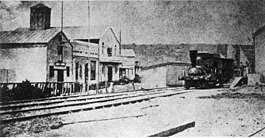Natal Railway Company
The Natal Railway Company was formed in January 1859 for the construction of a 3 kilometres (1.9 mi) railway in Durban.[1]
| Natal Railway Company | |
|---|---|
 The Natal arriving at Point Station, 26 June 1860 | |
| Technical | |
| Track gauge | 4 ft 8 1⁄2 in (1,435 mm) |
The Natal Railway Company made use of 4 ft 8 1⁄2 in (1,435 mm) broad gauge. The 3 ft 6 in (1,067 mm) Cape gauge was only adopted in Natal in 1876 when the Natal Government Railways was established.[2]
The railway's first steam locomotive, the 0-4-0 WT Natal, started operations on 26 June 1860. Up until that time the railway had been operated using ox-drawn wagons. The inaugural run was across a 2 mi (3.2 km) stretch from Market Square in Durban to the newly built Point station at Durban harbour.[3]
Alexander McArthur, the mayor of Durban described the new line in a letter to Sir George Grey.
We have some satisfaction in pointing also to the line of railway connecting the town and port, the first that has been brought into actual operation in South Africa. Its importance must not be measured by its length; for, short as it is, it has already, during its existence of a few weeks, been of essential service in expediting the traffic between the only port of our Colony and the interior. It is, besides, only the beginning of other lines which we hope soon to see inaugurated, and which will tend to carry ideas of English power and civilisation into the very strongholds of native ignorance and barbarism.
— Alexander McArthur, Mayor of Durban, [4]
The Natal Railway Company’s initial rolling stock consisted of six wagons, two travelling cranes and one passenger coach. By 25 January 1867 the line had been extended a further 3.5 mi (5.6 km) to Umgeni, from where stone, quarried from the Umgeni River, was transported to the harbour.[5]
All the assets of the Natal Railway Company, including its locomotive fleet of three, were purchased for the sum of £40,000 by the Natal Colonial Government in 1876. The railway continued to operate under the Natal Railway name until it became part of the Natal Government Railways with effect from 1 January 1877. The Natal remained in service for fifteen years, but since the newly established Natal Government Railways adopted 3 ft 6 in (1,067 mm) Cape gauge in conformance with the railways in the Cape Province, the existing lines were also converted to Cape gauge.[2][3][5][6][7]
See also
References
- "The first public railway in South Africa: The Point to Durban railway of 1860" (PDF). Natalia. 40: 21. December 2010. Retrieved 14 March 2011.
- Talbot, Frederick A. (1913). Railway wonders of the world. p. 606.
- Steam Locomotives of the South African Railways, vol 1: 1859-1910, (D.F. Holland, 1971), p11, 20-21, ISBN 0-7153-5382-9
- Henderson, W. P. M. (1904). Durban: fifty years' municipal history compiled for the Durban Corporation in celebration of the jubilee of the borough. Robinson. p. 43. Retrieved 15 March 2011.
- The South African Railways - Historical Survey (Editor George Hart, Publisher Bill Hart, Sponsored by Dorbyl Ltd, Circa 1978)
- Ingram, Joseph Forsyth (1895). The Colony of Natal: An Official Illustrated Handbook and Railway Guide. J. Causton. p. 45. Retrieved 15 March 2011.
- "The Railway System of Natal". Factory and Industrial Management. XXIV: 189. 1903. Retrieved 15 March 2011.